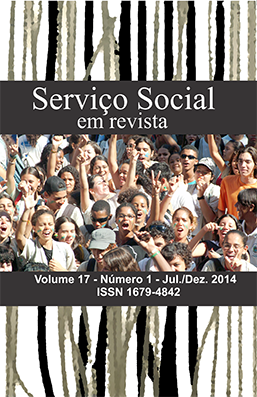Considerations about life conditions of elderly in Jequitinhonha Valley, Minas Gerais - Brazil
DOI:
https://doi.org/10.5433/1679-4842.2014v17n1p159Keywords:
Aged, Housing, Social conditions, AgingAbstract
The objective of this work is to describe the demographic, economic and health conditions variables of elderly co-residents in the municipality of Minas Gerais, since the longest life expectancy has awakened to the necessity of characterization of elderly populations. This is a cross-sectional epidemiological study, type population-based survey conducted with 279 elderly through a systematic sampling without replacement with sampling interval of 2, among those living in urban and rural areas aged greater than or equal to 60 years, enrolled in three (3) Family Health Strategies (ESF) that compose the municipality of Salto da Divisa and who had no cognitive impairment measured by the Mini Exam Mental State Examination (MMSE). Data were collected through the questionnaire Brazil Old Age Schedule (BOAS), tabulated in EpiInfo ® 7.7.0.6 and analyzed using SPSS ® 15.0. As main findings there were predominantly female (58.8%), with no schooling (64.2%), with income up to 1 SM (81.7%), tended to cohabit more with grandchildren (71.0%), were satisfied with the cohabiting (89.6%), possessed self-rated good health (60.6%) considered themselves to be happy with life (92.8%) and good expectations for the future (52,0%). The study revealed that despite low social determinants, the elderly in a state of co residence in the municipality possessed good psychosocial aspects and positive feelings about life, suggesting that the configuration of the family environment has been satisfying for the participants.Downloads
Downloads
Published
How to Cite
Issue
Section
License

This work is licensed under a Creative Commons Attribution-NonCommercial-NoDerivatives 4.0 International License.
A revista se reserva o direito de efetuar, nos originais, alterações de ordem normativa, ortográfica e gramatical, com vistas a manter o padrão culto da língua e a credibilidade do veículo. Respeitará, no entanto, o estilo de escrever dos autores. Alterações, correções ou sugestões de ordem conceitual serão encaminhadas aos autores, quando necessário. Nesses casos, os artigos, depois de adequados, deverão ser submetidos a nova apreciação. As provas finais não serão encaminhadas aos autores. Os trabalhos publicados passam a ser propriedade da revista Serviço Social em Revista, ficando sua reimpressão total ou parcial sujeita a autorização expressa da revista. Em todas as citações posteriores, deverá ser consignada a fonte original de publicação, no caso a Serviço Social em Revista. As opiniões emitidas pelos autores dos artigos são de sua exclusiva responsabilidade.














